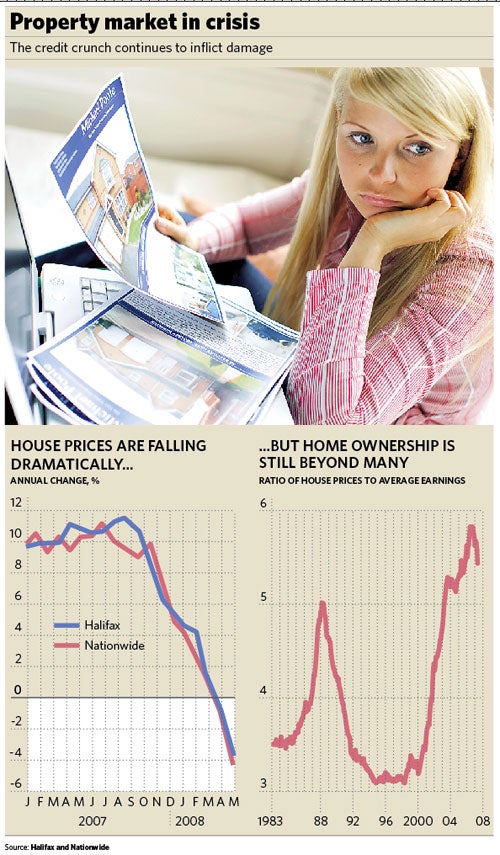Housing crash worse than feared as prices slump by 2.4 per cent

Your support helps us to tell the story
From reproductive rights to climate change to Big Tech, The Independent is on the ground when the story is developing. Whether it's investigating the financials of Elon Musk's pro-Trump PAC or producing our latest documentary, 'The A Word', which shines a light on the American women fighting for reproductive rights, we know how important it is to parse out the facts from the messaging.
At such a critical moment in US history, we need reporters on the ground. Your donation allows us to keep sending journalists to speak to both sides of the story.
The Independent is trusted by Americans across the entire political spectrum. And unlike many other quality news outlets, we choose not to lock Americans out of our reporting and analysis with paywalls. We believe quality journalism should be available to everyone, paid for by those who can afford it.
Your support makes all the difference.Britain is heading for a housing recession deeper and more painful than even the most pessimistic of observers thought possible, with price falls rivalling those seen in the slump of the early 1990s.
The Halifax House Price Index, published yesterday, showed that house prices fell by 2.4 per cent in May alone, by 6.3 per cent in the past three months and by 3.8 per cent this year. Confidence is unlikely to be boosted by yesterday's decision by the Bank of England to leave rates at 5 per cent. Few, if any, more cuts are anticipated this year as the Bank struggles to control rising inflation.
Since their peak last autumn, prices have dropped by 10 per cent in real terms. The average value of a British home is now £184,111, some £5,000 down on the month before. The Halifax figures are in line with those recently released by the Nationwide and others.
Commentators expressed surprise at the steepness of the decline in house values. Howard Archer, the chief UK economist at Global Insight, said: "The latest data on the housing market are undeniably alarming. Clearly, the downward pressure on house prices coming from stretched buyer affordability and tight lending conditions is now biting hard."
Malcolm Barr at JP Morgan added: "Our recently revised forecast for a 10 per cent fall in prices by the end of this year and 5 per cent next obviously looks too low when prices have already fallen by 5.4 per cent over just three months."
While the consensus last winter was that prices this year would remain flat, the general view now is that a 15 or 20 per cent fall, and possibly more, is likely by 2010. The Government's working assumption, inadvertently leaked by the Housing minister, Caroline Flint, is for a fall of 5 to 10 per cent this year.
Gloominess pervades the world of real estate. Even though prices are falling – and despite anecdotal evidence that suggests a degree of pent-up demand frustrated by a lack of mortgage finance exists – property prices remain way ahead of the historic norms in terms of people's incomes.
This close to the peak, affordability is still a factor, as is the credit crunch. Lenders have tightened their lending criteria because of the credit crisis, which has restricted their willingness to offer funding, particularly for the first-time buyers crucial to keeping the market buoyant.
Moneyfacts, a financial comparison website, says that the number of mortgage products on the market has fallen to a quarter of where it was a year ago. Sentiment, says the Royal Institution of Chartered Surveyors, is running at a 30-year low. The Bank of England reports that the real cost of a mortgage, reflecting money-market rates rather than the official Bank rate, is at an eight-year high.
The Bank also says that new mortgage approvals, a reliable leading indicator of what will happen to prices, are running at a very depressed level – their lowest for 15 years at least, and only about half their peak of last year. Construction firms such as Persimmon have simply stopped building homes for want of buyers. The final brake on demand may simply be the fact of falling prices, as buyers bide their time in the hope of securing bigger bargains.
The fall in house prices is "widely based", the Halifax said, though it identifies a particular weakness in the values of city-centre "regeneration" flats. Bungalows are apparently a safer bet, and Scotland is performing less badly than the rest of the country. The buy-to-let sector may prove especially vulnerable to a downturn, as the 50 per cent increase in buy-to-let mortgage arrears at the beleaguered Bradford and Bingley suggests.
Join our commenting forum
Join thought-provoking conversations, follow other Independent readers and see their replies
Comments